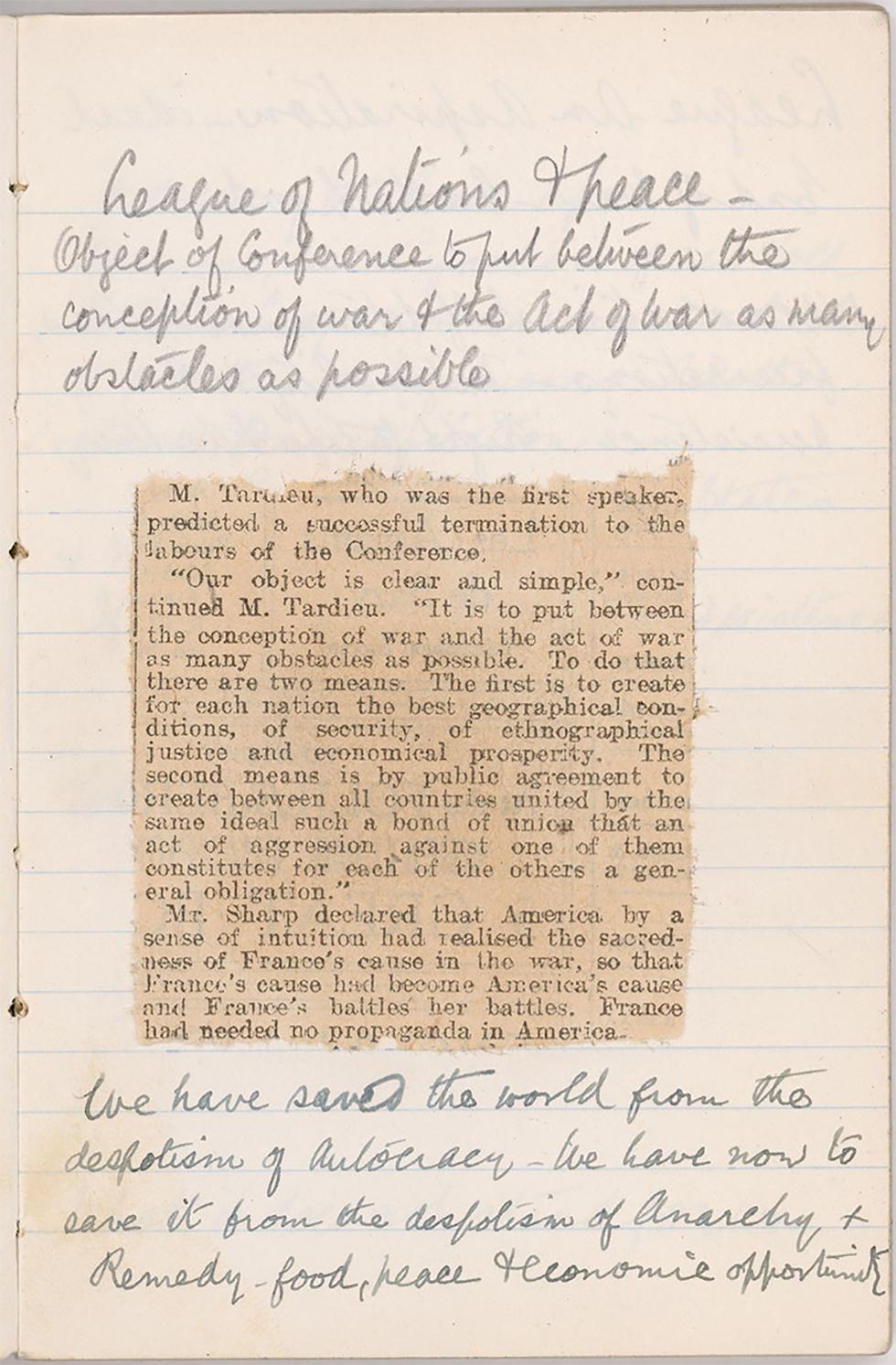


Transcript
[Handwritten:]
League of Nations & peace –
Object of conference to put between the conception of war & the act of war as many obstacles as possible
[Newspaper clipping:]
M. Tardieu, who was the first speaker, predicted a successful termination to the labours of the Conference.
“Our object is clear and simple,” continued M. Tardieu. “It is to put between the conception of war and the act of war as many obstacles as possible. To do that there are two means. The first is to create for each nation the best geographical conditions, of security, of ethnographical justice and economical prosperity. The second means is by public agreement to create between all countries united by the same ideal such a bond of union that an act of aggression against one of them constitutes for each of the others a general obligation.”
Mr. Sharp declared that America by a sense of intuition had realised the sacredness of France’s cause in the war, so that France’s cause had become America’s cause and France’s battles her battles. France had needed no propaganda in America.
[Handwritten:]
We have saved the world from the despotism of Autocracy – we have now to save it from the despotism of Anarchy & Remedy – food, peace & economic opportunity
About this record
This is a page from a notebook used by Australian Deputy Prime Minister Joseph Cook during the Paris Peace Conference held at Versailles after the First World War (WW1). The notebook contains notes and newspaper clippings concerning the proposed League of Nations and post-war peace terms. At the top of the page, in Cook’s own handwriting, are the words ‘League of nations & peace—Object of Conference to put between the conception of war & the act of war as many obstacles as possible’. André Tardieu, who is quoted in the newspaper clipping below these words, was the representative of the French Prime Minister during the conference. At the bottom of the page, Cook has written: ‘We have saved the world from the despotism of Autocracy. We have now to save it from the despotism of Anarchy & Remedy food, peace & economic opportunity’.
Educational value
- On 11 November 1918, representatives of Britain, France and Germany signed the Armistice that ended the fighting on the Western Front. The terms of the Armistice stated that Germany had to withdraw from all occupied territory, repatriate all Allied prisoners, and pay reparations for damage done during the war.
- The peace negotiations that followed the Armistice took place during what is known as the Paris Peace Conference of 1919. The main result of the conference was the Treaty of Versailles, signed at the Palace of Versailles near Paris on 28 June 1919. The Australian delegates at the conference were Prime Minister Billy Hughes and Deputy Prime Minister Joseph Cook (a former Prime Minister), who signed the treaty along with delegates from 42 other countries. During the negotiations, both Hughes and Cook argued strongly that reparations (compensation payments) be imposed on Germany, to punish it for the war and to prevent it from re-arming.
- One outcome of the Treaty of Versailles was the establishment of the League of Nations, which was the brainchild of US president Woodrow Wilson. It was hoped that this international body would maintain world peace, and ensure that war never broke out again, by sorting out international tensions as they occurred. It was based in Geneva, Switzerland—which was significant because Switzerland was a neutral country and did not fight in the First World War. The League of Nations existed from 1920 until the United Nations replaced it in 1946, after the end of WW1.
- The effectiveness of the League of Nations was limited by the fact that several important countries were not members. The United States of America chose not to join the League because of its domestic policy of isolationism. Germany was prevented from joining by the Treaty of Versailles, and Russia was denied membership on the basis of its communist government. Britain and France were powerful but—after the cost of the First World War—they had little capacity to contribute finances or military strength. This meant that the League of Nations could only issue verbal warnings or enforce economic sanctions.
- Joseph Cook was the Australian Prime Minister from 24 June 1913 to 17 September 1914. Just before war broke out, he had pledged his government’s full support for Britain and offered to send an initial force of 20,000 volunteers to serve overseas in the event of war. He was a strong supporter of conscription in both the 1916 and 1917 plebiscites. Cook was later Deputy Prime Minister (to Prime Minister Billy Hughes); Navy Minister from 1917 to 1920; and Treasurer from June 1920 to November 1921, when he resigned from Parliament.
Need help with your research?
Learn how to interpret primary sources, use our collection and more.

